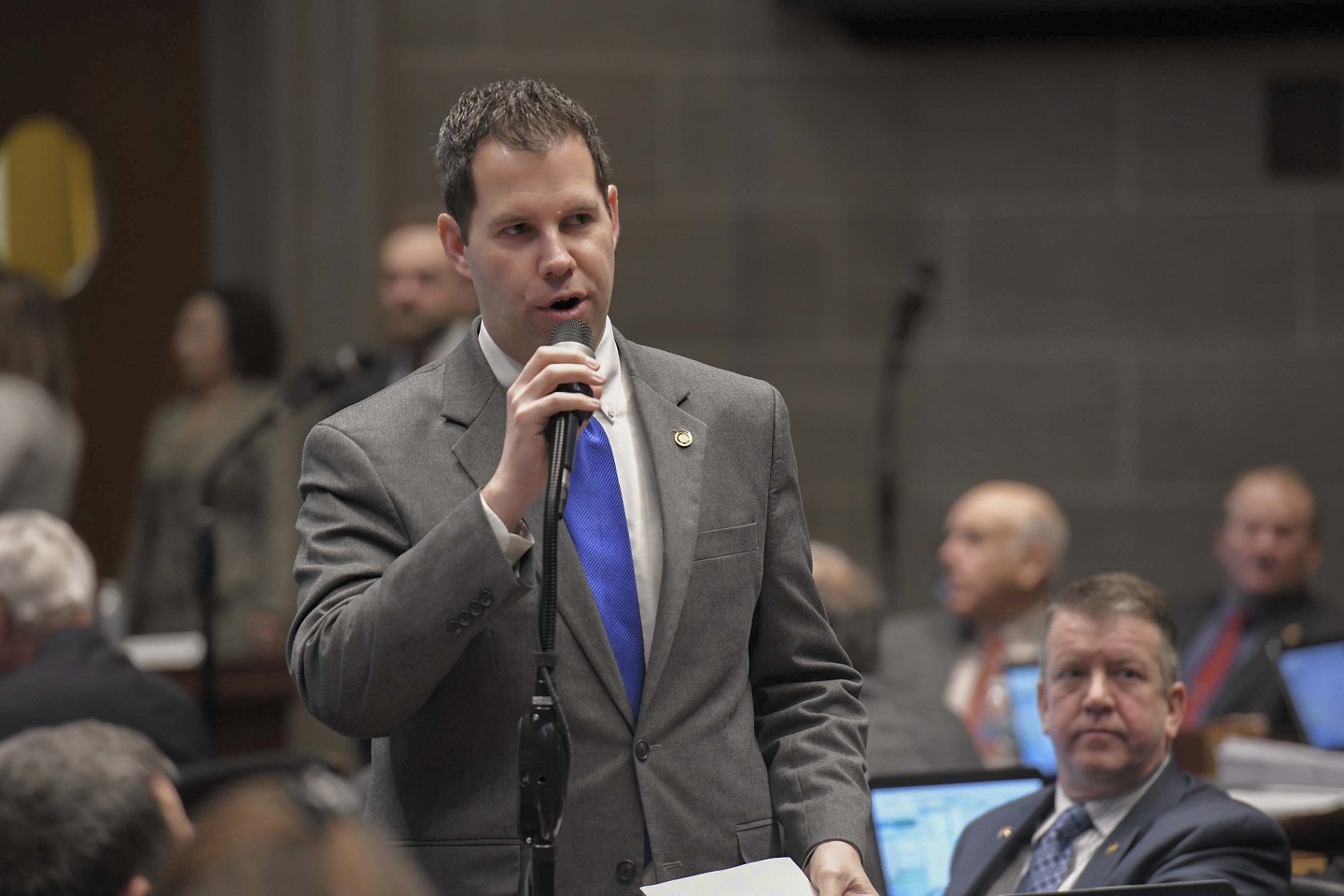Tag: Greg Razer
VIDEO: House Democrats highlight firearms legislation
House approves budget plan maintaining $100-million boost to transportation
The Missouri House has proposed a $29.2-billion state budget for the fiscal year that begins July 1. Among other things it maintains Appropriations Committee Chairman Cody Smith’s (R-Carthage) plan to apply $100-million of General Revenue to road and bridge projects. That would be in addition to the money in the state’s Road and Bridge Fund, which is dedicated to transportation.

If that proposal becomes law it would be the first time GR dollars have been used for transportation infrastructure. Smith said the state’s road funding has been falling behind for years, and with other proposals to support it having fallen short – including a gas tax increase that was rejected by voters in November – it’s time to consider unprecedented sources.
He also said his plan is a better option than what Governor Mike Parson (R) proposed, to use bonds to support $350-million for bridge projects, which take years to pay off.
“Going further into debt comes at a high cost. We already spend, on average, about 24-percent of the road fund on debt service as it is,” said Smith. “This plan, paying as we go, could save us as much as $100-million over the course of 15 years, and it’s really that simple.”
Democrats say this approach creates uncertainty for the Department of Transportation, which wouldn’t know year-to-year how much money the legislature might decide to give it.
Kansas City representative Greg Razer (D) said the plan also would set a precedent that transportation would compete with other state priorities that are already funded with GR dollars, including education and medical care.

Razer and other Democrats said the state should not get away from using only the Road and Bridge Fund to support transportation.
“It’s something that has served us well for nearly a century,” said Razer.
Democrats say $100-million won’t go very far toward meeting the transportation infrastructure needs across the state. Festus Republican Becky Ruth said a lot of options that have been considered might be short-term solutions. She said this one would be a good start.
“Right now we have to do something, and that’s what the people of Missouri [have] asked us to do,” said Ruth.
Smith said it is his intention to propose the use of General Revenue in future budget years to cover the projects that would’ve been paid for in the governor’s plan. Each year, then, that would have to be decided upon by the General Assembly.
The 13 budget bills that make up the House’s spending plan now go to the State Senate, which will propose changes to it. Then the two chambers will attempt to reach a compromise on a budget to be sent to the governor before the constitutional deadline of May 10.
House proposes tougher license revocation laws for those who hit workers, emergency responders
The Missouri House has proposed that the Department of Revenue Director be given authority to revoke the license of a driver who hits a road or utility worker in a highway work zone or an emergency responder at the scene of an emergency.

House Bill 499 was written in response to the death of a highway worker nearly three years ago. The man who struck and killed Lyndon Ebker in a work zone near New Haven was later revealed to suffer from macular degeneration that impaired his eyesight, but he was still driving more than two years later.
HB 499 was sent from the full chamber back to a House Rules committee for more work after some legislators raised concerns that earlier versions of it would deny a person of due process. Bill sponsor Aaron Griesheimer (R-Washington) said the changes address that.
Ebker’s family and the Department of Transportation pushed for the legislation. Lawmakers heard that the workers who’d been on Ebker’s crew felt unsafe because they knew the man who’d killed him was still on the road.
Kansas City representative Greg Razer (D) was one of those who listened to their testimony in a committee hearing.
Odessa Republican Glen Kolkmeyer also sits on the Transportation Committee. He said he’s glad to see this proposal advancing.
“I had a firefighter killed in the line of duty by a gentleman who came over a hill that should have never been on the road,” said Kolkmeyer. “We’re getting to name that road after that firefighter that was killed.”

Under the bill an officer investigating a work zone or emergency zone accident in which a worker or emergency responder was hit can file a report to the Department. The Director will revoke a driver’s license if he finds, based on that report, that the driver was at fault.
The driver then will have 15 days to prove competency by retaking and passing the driver’s test or by appealing to courts local to where the accident happened. If the court finds the driver was involved in hitting a worker; the work or emergency zone was properly marked; and the investigating officer found probable cause that the driver was at fault, the license revocation would stand.
Representative Rudy Veit (R-Wardsville) was one of those who raised concerns about due process with the earlier bill language. He said that 15 day provision answers his concerns. He now supports the bill.
“These workers are in a fearful position. That’s every day cars are whipping by them, and there’s two types of people that will hit them. One is those who aren’t competent to be driving. This will quickly remove them from the road. The second one is those who are driving reckless, and keep in mind those are the people we are putting more fear in,” said Veit. “They know if they do something they’re going to have swift, fast consequences, and I think this is another tool in the chest we need to protect the workers and to honor the workers who do this dangerous work and let us keep our roads open.”
In November the driver who struck Lyndon Ebker pled guilty to two charges and his driving privilege was revoked for life.
The House voted 149-5 to send the bill to the Senate.
Earlier story: Family of MoDOT worker killed in work zone asks lawmakers to toughen license revocation law
Gas tax increase goes from legislature to voters on November ballot
The legislature is asking voters whether they want to increase Missouri’s gas tax to pay for road and bridge work and to boost support of the Highway Patrol.

The House voted 88-60 to complete passage of House Bill 1460. It would ask voters in November whether to increase the state’s fuel tax by two-and-a-half cents a year for four years – a ten cent total increase by July, 2022. The current tax is 17-cents per gallon.
If passed, projections are the increase would generate about $421-million when fully implemented. $128-million would be for local governments for road construction and maintenance. The remaining $293.3-million would be appropriated by the General Assembly between the Department of Transportation to be used solely for road and bridge work, and the Highway Patrol.
Representative Jean Evans (R-Manchester) sponsored HB 1460, which was amended by the Senate to include the gas tax proposal.
“This is a vote to allow the people of Missouri a vote on how they want to pay for roads and bridges, how they’d like to fund their law enforcement,” said Evans. “Send this vote to the people. This is a vote for freedom and for safety.”
Kansas City Democrat Greg Razer said he was glad to see the House considering the ballot issue that would give the state a chance to take on pressing road and bridge work.
Kansas City Republican Kevin Corlew chaired the 21st Century Missouri Transportation System Task Force. It recommended a gas tax increase to help support transportation funding. He said whether such an increase will happen should be up to voters.
The House vote sent HB 1460 to the Secretary of State, who’s office is preparing it for the November ballot. Many of the 60 “no” votes were cast by Republicans.

St. Peters representative Phil Christofanelli (R) called the proposal a “massive” and “deceptive” tax increase.
“The voters already had an opportunity to vote on raising taxes for transportation. They said, ‘no,’ and here we are, coming back today, poll testing different ideas, how can we sell this idea that the voters have already rejected?” said Christofanelli. “We’re all going to go back to our districts – many of us in this [Republican] majority – and tell people how conservative we are, we are conservatives. The voters believe that conservatives are here to shrink the size of government and not to grow the size of government, and that is exactly what we’re doing today.”
Representative Rocky Miller (R-Lake Ozark) said this measure is flawed and he will oppose it even though his district needs road maintenance and improvements.
HB 1460 was originally a bill that would waive state tax liability on cash prizes awarded to Olympic medalists. Another provision in the bill would create an “Emergency State Freight Bottleneck Fund,” that would pay for road projects costing $50-million or more that would relieve bottlenecks or delays of 20 minutes or more on Missouri roads.
The bill would also allow alternative fuels to be taxed at a substantially equivalent rate by 2026.
Because it was changed to include the ballot language for the gas tax, the language voters will see on the ballot will also ask them whether the state should waive tax liability for Olympic medal winners and could include language about the Bottleneck Fund as well.
House Budget Committee members frustrated by Capitol metal detectors
Members of the state House Budget Committee have told the Greitens Administration they aren’t pleased with how it paid to keep operating metal detectors in the State Capitol.

The state legislature passed a budget that approved paying for additional police officers to patrol the Capitol while the metal detectors, which were installed shortly before Eric Greitens (R) became governor, would be removed. Greitens’ administration has paid contract workers to continue operating those detectors using money out of a fund for building maintenance.
Lawmakers on the budget committee expressed frustration not only at how the administration is paying for those contract workers, but also at Greitens’ continued support for using metal detectors.
Representative Kathie Conway (R-St. Charles), who chairs the House Appropriations Subcommittee on Public Safety, was critical of the administration’s decision to use money from the maintenance fund to pay to staff the detectors – a step that was done without the legislature knowing about it or approving it.
“We need to be in the loop,” said Conway.
Not all budget committee members were as upset with the administration’s actions.
Kansas City Democrat Greg Razer asked Greitens’ Office of Administration Commissioner, Sarah Steelman, what would happen if the detectors are removed and an incident occurs at the Capitol.

“No, I don’t think we can,” said Steelman.
Fitzpatrick said he is, “somewhat indifferent,” about the metal detectors being in place, but he remains frustrated about the administration funding the staffing of those without the legislature’s approval.
He did say he does not want to see Capitol Police officers staffing those detectors after the legislature approved money for more officers to be hired so the Capitol halls would be patrolled.
“I’m going to have a major problem with that,” said Fitzpatrick.